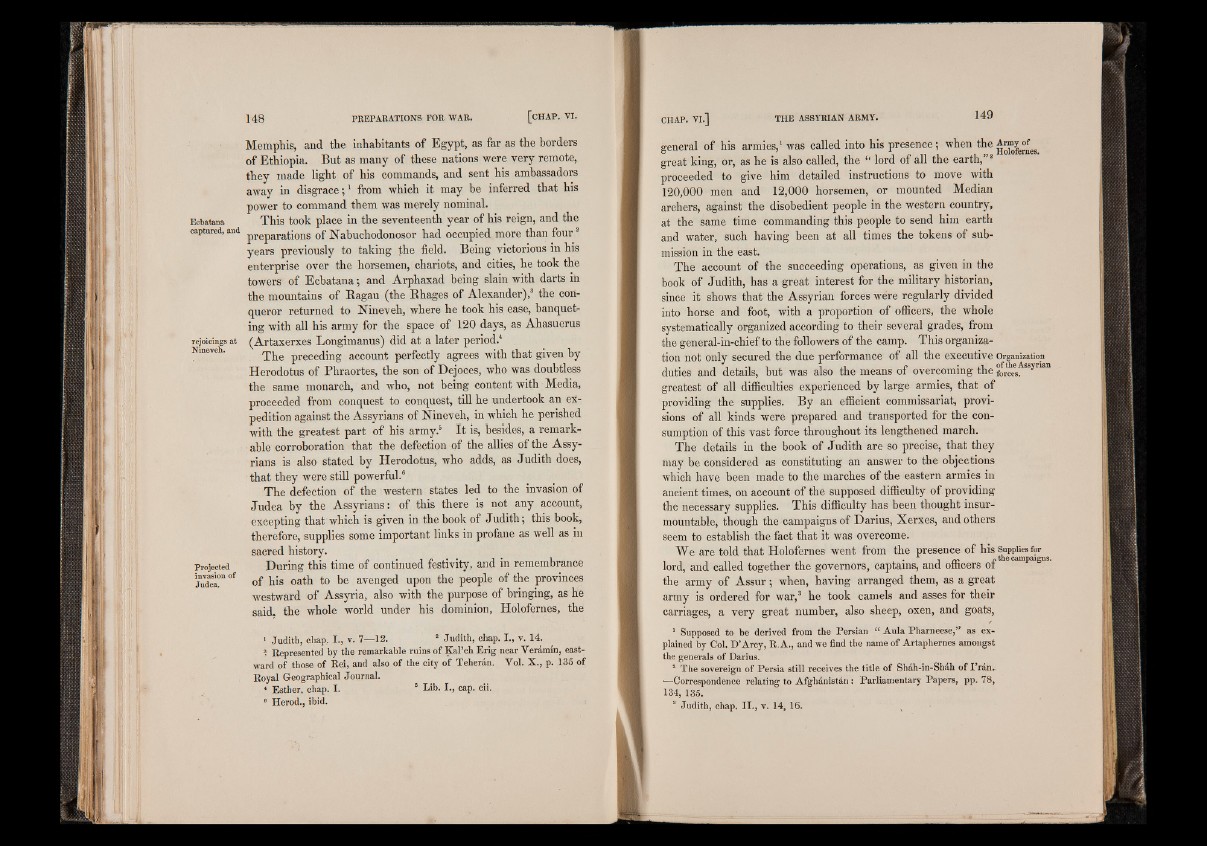
Ecbatana
captured, and
rejoicings at
Nineveh.
Projected
invasion of
Judea.
Memphis, and the inhabitants of Egypt, as far as the borders
of Ethiopia. But as many of these nations were very remote,
they made light of his commands, and sent his ambassadors
away in disgrace ; 1 from which it may be inferred that his
power to command them was merely nominal.
This took place in the seventeenth year of his reign, and the
preparations of Nabuchodonosor had occupied more than four2
years previously to taking the field. Being victorious in his
enterprise over the horsemen, chariots, and cities, he took thè
towers of Ecbatana ; and Arphaxad being slain with darts in
the mountains of Bagau (the Rhages of Alexander),3 the conqueror
returned to Nineveh, where he took his ease, banqueting
with all his army for the space of 120 days, as Ahasuerus
(Artaxerxes Longimanus) did at a later period.4
The preceding account perfectly agrees with that given by
Herodotus of Phraortes, the son of Dejoces, who was doubtless
the same monarch, and who, not being content with Media,
proceeded from conquest to conquest, till he undertook an expedition
against the Assyrians of Nineveh, in which he perished
with the greatest part of his army.6 It is, besides, a remarkable
corroboration that the defection of the allies of the Assyrians
is also stated by Herodotus, who adds, as Judith does,
that they were still powerful.6
The defection of the western states led to the invasion of
Judea by the Assyrians: of this there is not any account,
excepting that which is given in the book of Judith; this book,
therefore, supplies some important links in profane as well as in
sacred history.
During this time of continued festivity, and in remembrance
of his oath to be avenged upon the people of the provinces
westward of Assyria, also with the purpose of bringing, as he
said, the whole world under his dominion, Holofernes, the
1 Judith, chap. I ., v. 7—12. 8 Judith, chap. I., v. 14.
Represented by the remarkable ruins o f Kal’eh E rig near Verámin, eastward
of those of Rei, and also of the city of Teheran. Vol. X., p. 135 of
Royal Geographical Journal.
4 Esther, chap. I. 5 Eib. I., cap. cii.
6 Herod., ibid.
general of his armies,1 was called into his presence; when the
great king, or, as he is also called, the ‘‘ lord of all the earth,”2
proceeded to give him detailed instructions to move with
120,000 men and 12,000 horsemen, or mounted Median
archers, against the disobedient people in the western country,
at the same time commanding this people to send him earth
and water, such having been at all times the tokens of submission
in the east.
The account of the succeeding operations, as given in the
book of Judith, has a great interest for the military historian,
since it shows that the Assyrian forces were regularly divided
into horse and foot, with a proportion of officers, the whole
systematically organized according to their several grades, from
the general-in-chief to the followers of the camp. This organization
not only secured the due performance of all the executive Organization
duties and details, but was also the means of overcoming the
greatest of all difficulties experienced by large armies, that of
providing the supplies. By an efficient commissariat, provisions
of all kinds were prepared and transported for the consumption
of this vast force throughout its lengthened march.
The details in the book of Judith are so precise, that they
may be considered as constituting an answer to the objections
which have been made to the marches of the eastern armies in
ancient times, on account of the supposed difficulty of providing
the necessary supplies. This difficulty has been thought insurmountable,
though the campaigns of Darius, Xerxes, and others
seem to establish the fact that it was overcome.
We are told that Holofernes went from the presence of his Supplies for
. the campaigns. lord, and called together the governors, captains, and officers ot
the army of Assur; when, having arranged them, as a great
army is ordered for war,3 he took camels and asses for their
carriages, a very great number, also sheep, oxen, and goats,
1 Supposed to be derived from the Persian “ Aula Pharneese,” as explained
by Col. D’Arcy, It. A., and we find the name o f Artaphernes amongst
the generals of Darius.
a The sovereign of Persia still receives the title of Shah-in-Shah of I ’ran.
—Correspondence relating to Afghanistan : Parliamentary Papers, pp. 78,
134, 135.
“ Judith, chap. I I ., v. 14, 16. >